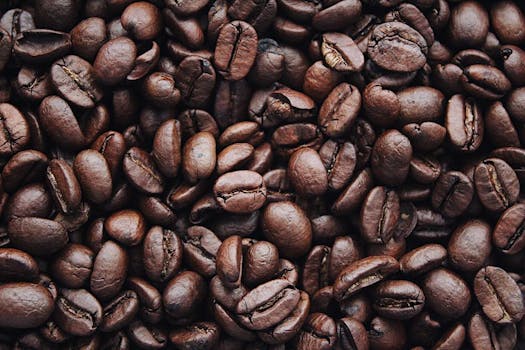Dogs are naturally curious creatures, often sniffing or trying to taste whatever they can find. But when it comes to coffee beans, their curiosity can lead to serious health concerns. If your pup has gotten into coffee beans or you’re wondering if they’re safe, this guide will explain everything you need to know.
☕ Why Are Coffee Beans Dangerous for Dogs?
Coffee beans contain caffeine, a stimulant that is toxic to dogs. While caffeine can give humans an energy boost, it can overwhelm a dog’s nervous system, heart, and digestive tract. Even small amounts can pose risks, especially for smaller breeds or puppies.
Here’s why coffee beans are harmful to dogs:
- Caffeine levels in coffee beans are highly concentrated compared to brewed coffee.
- Dogs metabolize caffeine much slower than humans, leading to prolonged effects.
- Theobromine, another compound in coffee, is also toxic to dogs (similar to chocolate).
When a dog consumes coffee beans, the effects can range from mild to severe depending on the amount ingested and the dog’s size. Understanding the risks can help you act quickly in case of an emergency.
🐾 Symptoms of Caffeine Poisoning in Dogs
If your dog eats coffee beans, signs of caffeine poisoning may appear within 1–2 hours. These symptoms can escalate quickly, so it’s important to monitor your pet closely.
Common symptoms include:
- Restlessness or hyperactivity
- Rapid breathing or panting
- Increased heart rate
- Vomiting or diarrhea
- Muscle tremors or seizures
- Weakness or collapse
In severe cases, caffeine poisoning can lead to coma or even death if left untreated. Always contact your vet immediately if you suspect your dog has consumed coffee beans.
🍴 How Do Dogs Get Into Coffee Beans?
Dogs can accidentally eat coffee beans in various ways, especially if they have access to areas where coffee is stored or prepared. Here are some common scenarios:
- Eating whole coffee beans left out on a counter or table
- Chewing on coffee bean bags or packaging
- Getting into compost or garbage containing coffee grounds
- Consuming chocolate-covered coffee beans (a double toxicity risk)
To prevent accidental ingestion, always store coffee beans and related products in a secure, dog-proof location.
🩺 What to Do if Your Dog Eats Coffee Beans
If you suspect your dog has eaten coffee beans, quick action is crucial. Follow these steps to ensure their safety:
- Remove any remaining coffee beans from your dog’s reach.
- Check for symptoms of caffeine poisoning (see the list above).
- Contact your veterinarian or an emergency pet poison hotline immediately.
- Provide your vet with details such as your dog’s size, the amount consumed, and the time of ingestion.
Do not attempt to induce vomiting or treat your dog at home unless instructed by a professional. Your vet may recommend bringing your dog in for treatment, which could include activated charcoal to absorb toxins, IV fluids, or medications to stabilize their heart rate.
🐶 Can Dogs Have Decaffeinated Coffee Beans?
Even decaffeinated coffee beans are not safe for dogs. While they contain less caffeine, trace amounts can still be harmful, especially if consumed in large quantities. Additionally, the oils and compounds in coffee beans can upset a dog’s stomach or cause other health issues.
For the safety of your pet, avoid giving them any form of coffee, including decaffeinated products.
✅ Safe Alternatives to Coffee for Dogs
If you’re tempted to share your morning ritual with your dog, consider these pet-friendly alternatives instead:
- Plain water (always the best choice for hydration)
- Low-sodium bone broth
- Dog-safe herbal teas (e.g., chamomile, in moderation)
These options can provide a bonding moment without putting your dog’s health at risk.
FAQs
Q: How many coffee beans are toxic to dogs?
A: The toxic dose of caffeine depends on your dog’s size, but even a few coffee beans can cause symptoms in smaller breeds. It’s best to treat any ingestion as a potential emergency.
Q: Can a small amount of coffee harm my dog?
A: Yes, even a small amount of coffee or coffee beans can lead to caffeine poisoning, especially in small dogs or puppies. Always err on the side of caution and consult your vet.
Q: Are coffee grounds more dangerous than coffee beans?
A: Both coffee grounds and beans are highly concentrated sources of caffeine. Coffee grounds may pose a greater risk because they are easier for dogs to consume in large quantities, such as from a trash bin.
Q: How long does it take for caffeine poisoning symptoms to appear?
A: Symptoms of caffeine poisoning usually appear within 1–2 hours of ingestion. However, the effects can last for several hours or even days, depending on the dose.
Q: Should I try to make my dog vomit if they eat coffee beans?
A: No, do not attempt to induce vomiting unless directed by a veterinarian. Improper handling can worsen the situation. Always seek professional advice first.
References
Book a $49 online vet consultation at https://www.dialavet.com for fast, expert advice.







